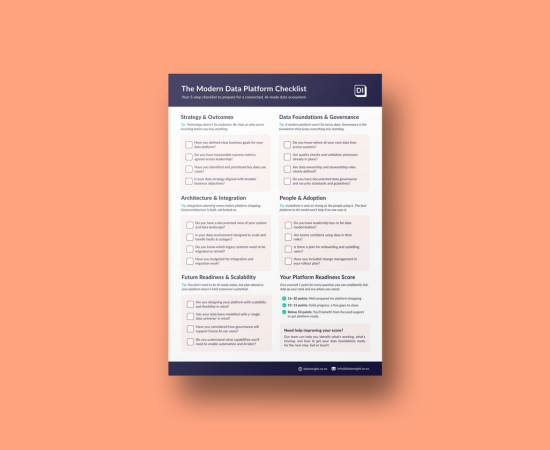Selecting the right data partner can be challenging, especially with so many options available.
.png)
With technology advancing rapidly, it's crucial to consider not just the data itself but the entire process of turning data into valuable insights.
To make an informed decision, it’s important to know what to look for to ensure your business gets the most value from its data. Data Insight has been helping businesses make sense of their data for over 11 years.
Here’s what we think you should look out for when selecting a data partner:
1. Comprehensive Services
A well-rounded data partner offers solutions that cover all areas of your operations, from finance to marketing. They should also address all parts of the data value chain, from warehousing and single customer universe, through to reporting and even machine learning and AI.
Look for a partner that provides comprehensive services to meet all your data needs, including:
- Data Strategy and Governance: Ensuring your data is well-managed and aligned with your business goals, enabling informed decision-making and regulatory compliance. This helps businesses operate more efficiently and avoid costly mistakes.
- Technology Advice and Review: Providing expert guidance on the best technologies to adopt, helping you stay ahead in a rapidly evolving landscape. This ensures your business is leveraging the most effective tools to maintain a competitive edge.
- Single Customer Universe Design and Build: Creating a unified view of yourcustomers to enhance personalisation and drive more effective marketingstrategies. This leads to better customer experiences and increased loyalty.
- Reporting/Dashboard Creation and Consolidation: Streamlining and optimising reporting processes. Efficient reporting and dashboards are vital for informed decision-making. Audits and consolidation help in identifying gaps, improving accuracy, and making data insights more accessible.
- Process Optimisation: Enhancing efficiency and operational excellence through data-driven strategies. Data-driven process optimisation helps businesses streamline their operations, reduce costs, and improve efficiency, leading to better overall performance.
- Customer Insights and Personalisation: Leveraging data to understand customer behavior and tailor experiences. Analysing customer data helps businesses understand preferences and behaviors, enabling targeted marketing and personalised experiences that boost satisfaction and loyalty.
- Advanced Analytics, Machine Learning, and AI: Utilising cutting-edge analytics and AI technologies to uncover deeper insights and drive innovation across your business. This enables smarter decision-making and can significantly enhance business outcomes.
2. Innovation and Adaptability
The data and technology landscape is constantly evolving, and markets are moving faster than ever before, so it’s important to choose a partner who stays ahead of the curve and helps you to do the same.
Ensure they invest in learning and adopting the latest technologies and methodologies to keep their solutions innovative and effective. Looking at new ways of doing things and adapting approaches and solutions to best take advantage of your business's unique skills and assets is critical to helping you build a competitive advantage.
3. Being Tool & Tech Agnostic
A good data partner isn’t restricted to one specific software or platform—they're versatile and can use a variety of tools to meet your unique needs.
They should be comfortable with both legacy and cutting-edge technologies, ensuring solutions are precise, scalable, and efficient.
Some common tools and technologies to look for include:
- Microsoft Fabric: For data integration and orchestration.
- Azure Synapse Analytics: For powerful analytics and data warehousing.
- Power BI: For interactive data visualisation.
- Snowflake: For flexible and scalable cloud data storage.
- AWS and Google Cloud: For versatile cloud computing solutions.
- Databricks: For unified data analytics and machine learning.
4. Client-Centric Approach
Your data analytics partner should take the time to get to know you—your assets, team, needs, and goals.
A personalised approach allows them to develop solutions that truly add value. Strong relationships lead to smoother workflows and more effective projects.
5. Experience and Expertise
When it comes to complex data challenges, experience is crucial. Look for a partner with a proven track record and a wide range of expertise.
A partner with over a decade of experience working with diverse clients, from small businesses to large corporations, will likely have the broad skill set needed to tackle any problem and deliver actionable insights. Especially if they show experience with both legacy systems and cutting-edge ones like Snowflake and Microsoft Fabric, as this shows they are staying relevant.
6. Support and Collaboration
Effective data analytics requires continuous support and collaboration. Look for a partner who will be with you from start to finish, offering support and guidance throughout the process.
This includes initial consultation, strategy development, implementation, and ongoing maintenance. A collaborative approach ensures that your data strategies remain aligned with your business goals and can adapt to changing needs. A good data partner sets you up to be self-serve in many areas, empowering you to remain independent, while augmenting your teams with a trusted partner when extra capacity or capability is required.
7. AI Integration
Artificial Intelligence (AI) is transforming the way businesses operate but doing so meaningfully is not a "plug and play” solution. Look for a partner who understands that successful AI integration requires building the right foundations.
This includes preparing your data, establishing robust processes, and ensuring your infrastructure can support AI initiatives. Your partner should help you develop a strategy that integrates AI effectively into your operations, enhancing decision-making and driving growth. This includes governance, strategy, execution, and maintenance.
Choosing the right data partner is essential for getting the most out of your data.
By focusing on finding a partner with comprehensive services, an innovative approach, and a tool-agnostic and client-centric mindset, you can ensure your business is well-supported. Additionally, look for a partner with broad experience, a commitment to support and collaboration, and a deep understanding of AI.









.png)